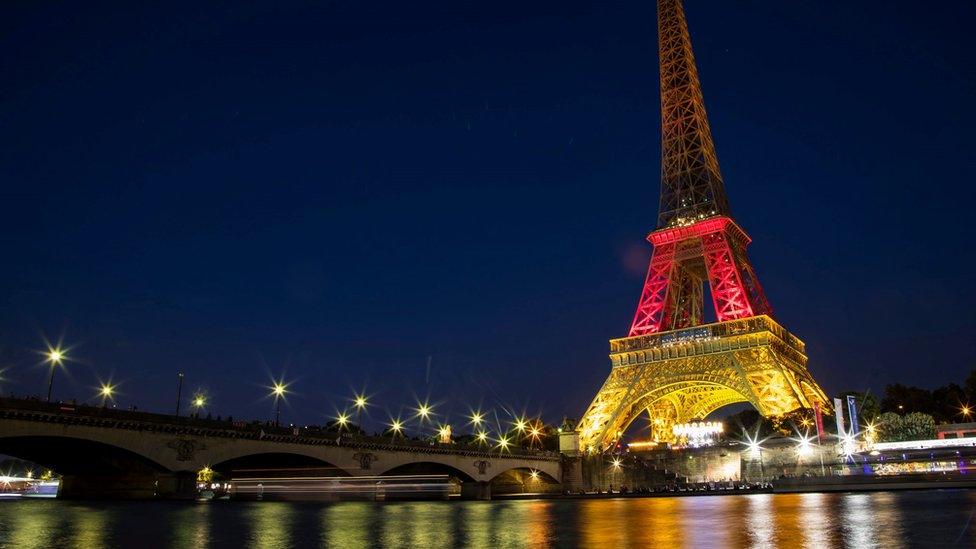Germany shooting: Investigation into 'deeply racist' gunman's links
- Published
Muhammed spoke from hospital about how he survived the shooting
The investigation into a deadly gun attack in Hanau is focusing on whether others knew about or helped organise it, Germany's federal prosecutor says.
The suspect shot dead nine people "of migrant background" at two shisha bars on Wednesday evening. He and his mother were later found dead in his flat.
Peter Frank said material the suspect Tobias R had posted online showed a "deeply racist mindset".
He had also been influenced by conspiracy theories, Mr Frank said.
Earlier Chancellor Angela Merkel said there were many signs Tobias R, 43, had acted out of racism.
Speaking in Berlin, Mrs Merkel said: "Racism is a poison. Hate is a poison and this poison exists in our society and is already to blame for many crimes."
Thousands of people have attended vigils in Hanau and cities across Germany.
People came together in Hanau and Berlin to remember the victims
Turkey says at least five of the dead were Turkish citizens. President Recep Tayyip Erdogan said he expected Germany to "throw light on all aspects" of the attack.


Nazi salutes, banned swastika emblems and even the playing of the Horst Wessel, the one-time Nazi "anthem" - all have been cropping up in far-right extremist circles as Germany struggles to contain a growing wave of home-grown extremism.
The problem has been particularly acute in - but not confined to - the east of the country, in the former East Germany. There, unemployment levels have been higher than in the rest of Germany and a simmering resentment, by some, of the recent immigrant arrivals has manifested itself in arson attacks on hostels.
In 2015 Germany opened its borders to an estimated 1.5 million refugees from the Middle East. Although the number of subsequent incidents involving them has been very small, their arrival has been used by far right extremists to stoke ethnic tensions and recruit more young men and women to their cause.

What did the prosecutor say?
Mr Frank said six people had also been injured in the attack, one of them seriously.
Shortly after the attacks the suspect and his 72-year-old mother were found in his apartment, both also shot. A gun was found next to the suspect's body.
Eyewitnesses filmed the aftermath of the shooting
Mr Frank said investigators wanted to establish any links the suspect may have had in Germany or potentially also abroad.
"My sympathies to the loved ones of the victims. I wish the injured a swift recovery. It is a day that will live long in our memory and will motivate our investigations," Mr Frank said at a short news conference.
What do we know about the attacks?
The shootings took place around 22:00 (21:00 GMT) on Wednesday, and the first target was the Midnight shisha bar in the city centre of Hanau. Witnesses reported hearing about a dozen gunshots.
The suspect then travelled by car to the Kesselstadt neighbourhood, some 2.5km (1.5 miles) away, and opened fire at the Arena Bar & Cafe.
Shisha bars are places where people gather to smoke a pipe known as shisha or hookah. Traditionally found in Middle Eastern and Asian countries, they are also popular in many other parts of the world.
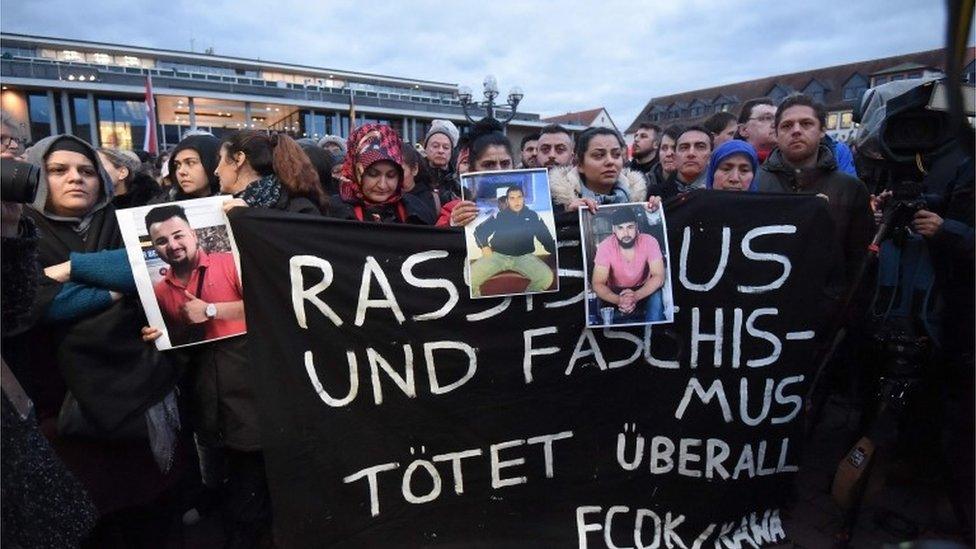
Hanau residents demonstrated against racism
The shootings sparked a manhunt. Police identified the gunman through information from witnesses and surveillance cameras. Early on Thursday, they stormed the suspect's home, near the scene of the second shooting.
Hanau, in Hesse state, is a city of 100,000 residents about 25km east of Frankfurt.
Who were the victims?
They included German citizens and foreigners aged between 21 and 44, Germany's federal prosecutor said.
Among the dead were "several victims of Kurdish origin", the Kon-Med association of Kurds in Germany said, adding that it was "furious" the authorities were not doing more to fight extremism.
A Bosnian and a Bulgarian also died in the attack, those countries' foreign ministries said.
Ali Can, a German-Turkish anti-racism activist, posted a photo of a friend of his cousin, saying that the friend was among those killed.
Writing on Twitter he said: "We can't spend a peaceful evening out, we're scared for our lives. What is happening in Germany? Where is the protection?"
Allow X content?
This article contains content provided by X. We ask for your permission before anything is loaded, as they may be using cookies and other technologies. You may want to read X’s cookie policy, external and privacy policy, external before accepting. To view this content choose ‘accept and continue’.

What do we know about the suspect?
Tobias R had posted videos and a kind of manifesto on his website, Mr Frank said.
In the manifesto he wrote that people from more than 20 countries including Turkey and Israel should be "destroyed", AFP reported.
London-based German counter-terrorism expert Peter Neumann said the text contained "various, but mostly extreme right views, with a do-it-yourself ideology cobbled together out of parts found on the internet".
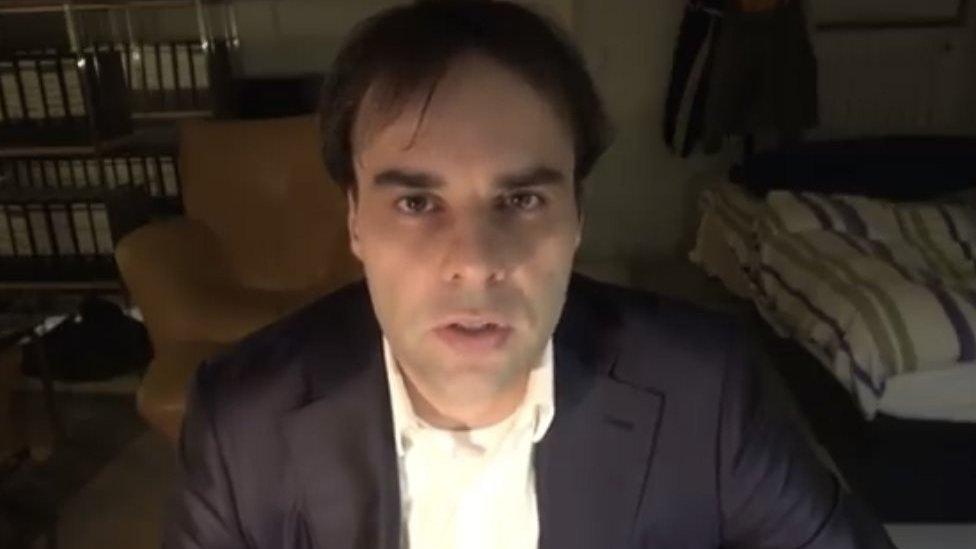
The suspect has been identified as Tobias R
"The pattern is clear, and not at all new," he added.
In her statement, Mrs Merkel said there were "many indications at the moment that the perpetrator acted on right-wing extremist, racist motives, out of hatred towards people of other origins, religion or appearance".
Hesse state Interior Minister Peter Beuth said the suspect had not previously been known to the authorities.
The Bild tabloid reports he had a firearms licence, and that ammunition and gun magazines were found in his car.
Claus Schmidt, who runs the Diana Bergen-Enkheim shooting club that Tobias R joined, described him as "totally inconspicuous".
"There was not a hint of racism or hatred towards foreigners, not even an awkward joke. He was always friendly," he told Reuters.
Gun laws in Germany are among the most stringent in the world, and were tightened further in recent years after other mass shootings.

Recent far-right attacks in Germany
October 2019: In Halle, an attacker kills two and tries to storm a synagogue, broadcasting the assault live online. He later admits a far-right, anti-Semitic motive for the attack
June 2019: Walter Lübcke, a pro-migrant politician, is shot in the head at close range and found dead in his garden. A suspect with far-right links later confesses to the murder
July 2016: An 18-year-old shoots dead nine people at a shopping mall in Munich before killing himself. Bavarian authorities later classify the attack as "politically motivated", saying the teen had "radical right-wing and racist views"

What has the reaction been?
Hanau Mayor Claus Kaminsky said it had been the "hardest day in our history". He said the city had seen centuries of peaceful coexistence between different faiths and cultures - "That is why it is so hard to understand".
Hesse state leader Volker Bouffier said the state parliament had travelled to Hanau to show its solidarity with the victims and their families. He said the attack "came out of a climate" that existed "to some degree worldwide" in which people are targeted because they are different.
"We will do everything to show that people don't have to be afraid and show them that they belong with us, " he said.
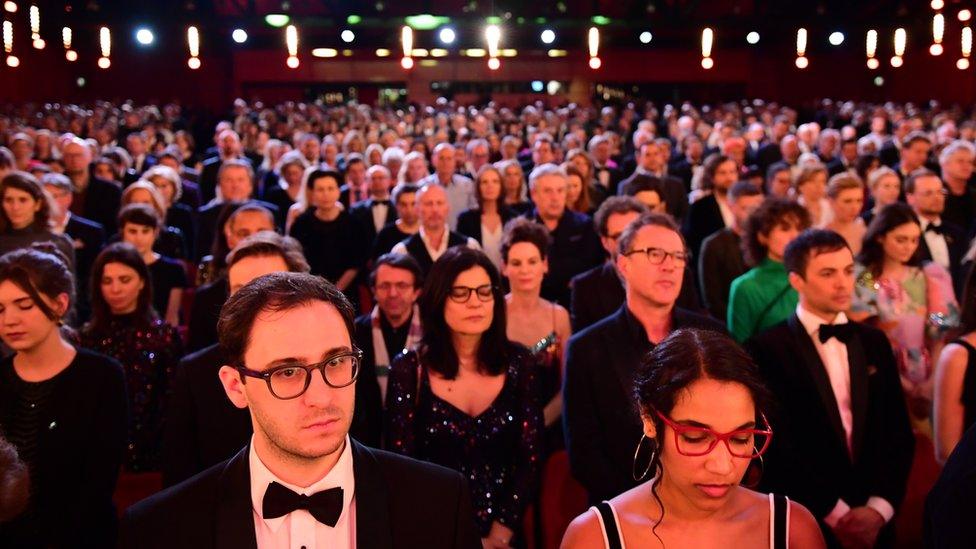
A minute's silence was held at the opening of the Berlin International Film Festival
However the co-leader of the far right AfD party said the attack was "neither right- nor left-wing terrorism" but the actions of "a madman". Politicians from the rest of political spectrum accused the expressly anti-Islam and anti-immigration AfD of stirring up anti-foreigner hatred.
In other reaction:
German Defence Minister Annegret Kramp-Karrenbauer: "The background must now be clarified further. Violence from right-wing extremists must not let us rest, we must stand against it"
Ursula von der Leyen, European Commission President and former German government minister: "I am deeply shocked by the tragedy that took place... in Hanau"
French President Emmanuel Macron: "Immense sadness and my full support for Germany in the face of this tragic attack... I stand with Chancellor Merkel in this fight for our values and the protection of our democracies"
Germany's Muslim association KRM called for more to be done in the fight against right-wing extremism, saying they had requested for months that needed to be "a clear stand against Islamophobia"


Were you in the area? Share your experiences by emailing haveyoursay@bbc.co.uk, external.
Please include a contact number if you are willing to speak to a BBC journalist. You can also contact us in the following ways:
WhatsApp: +44 7756 165803
Tweet: @BBC_HaveYourSay, external
Send pictures/video to yourpics@bbc.co.uk, external
Please read our terms & conditions and privacy policy
- Published19 February 2020
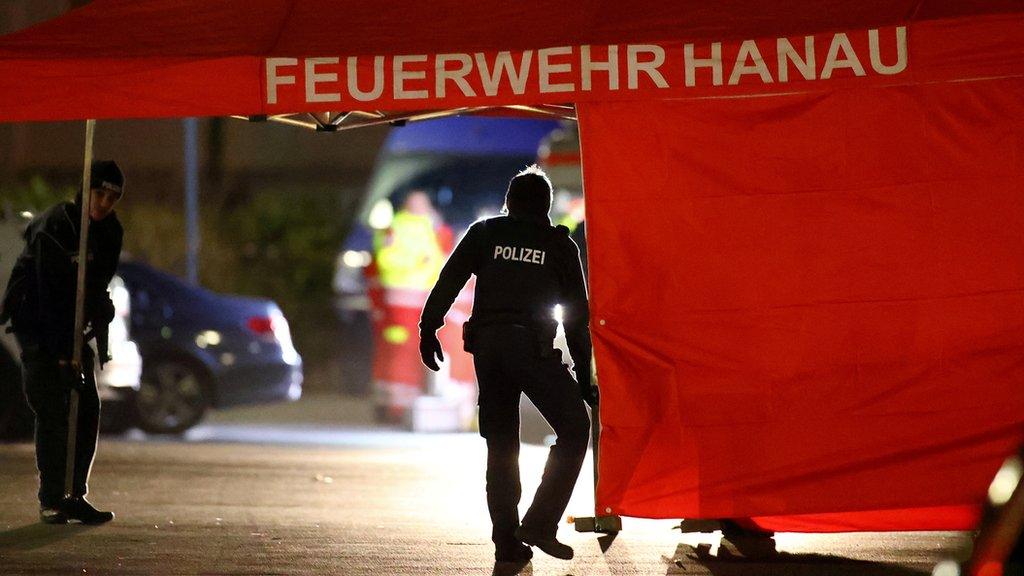
- Published20 February 2020
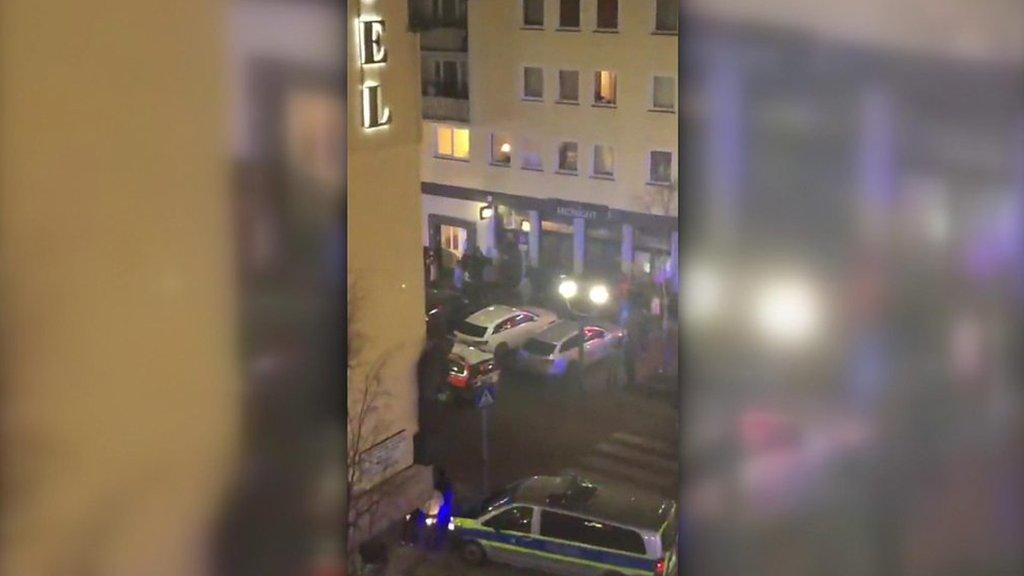
- Published24 July 2016
